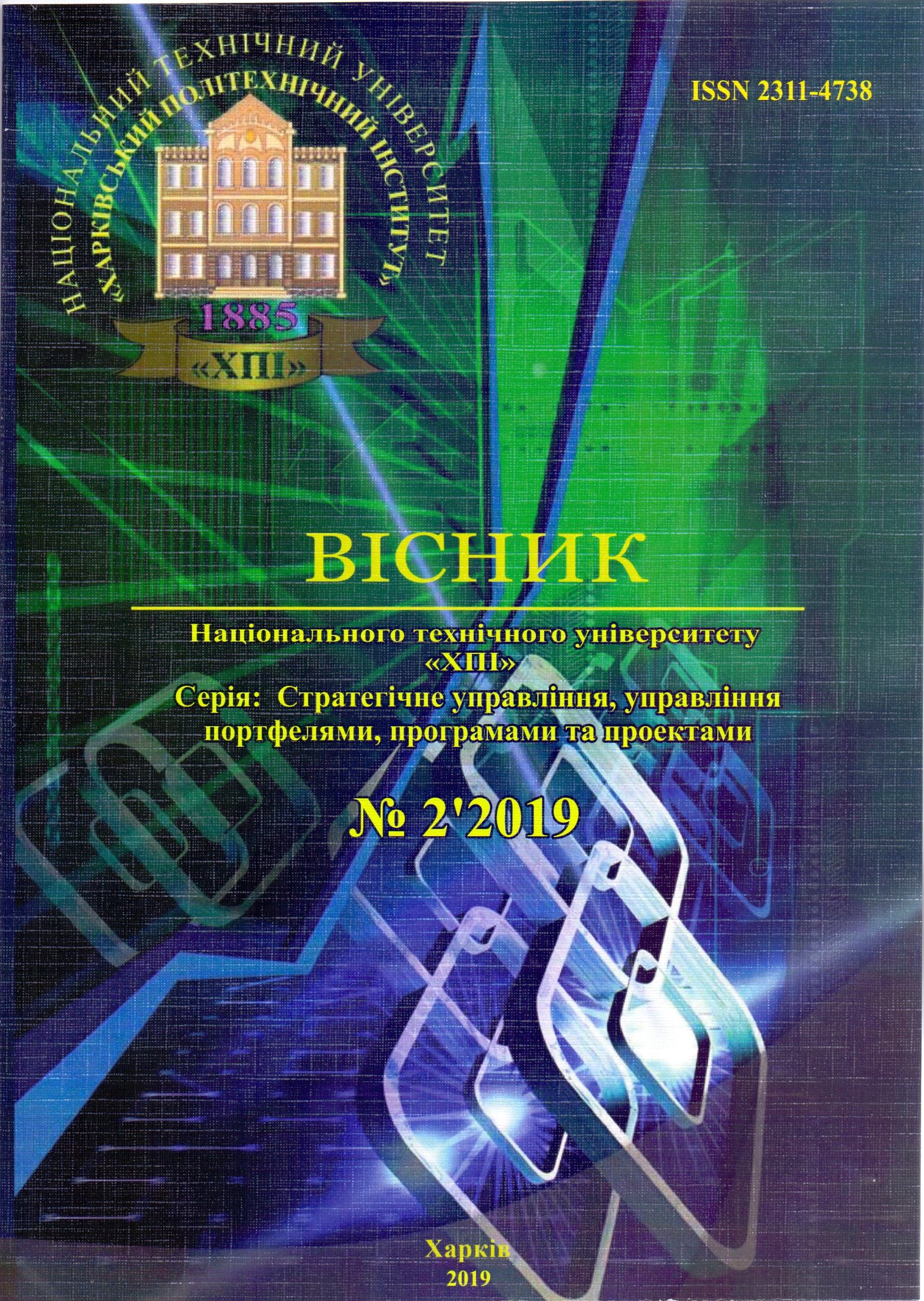STRUCTURAL MODEL OF MANAGEMENT SYSTEM OF DEVELOPMENT PROGRAMS AT THE ENTERPRISE
DOI:
https://doi.org/10.20998/2413-3000.2019.1327.8Keywords:
project, program, development programs, program management, program management systems, information applicationsAbstract
In today’s organization, almost all actions are automated, but in terms of activities that could maximally contribute to the success of the organization (namely, such activity is the work on development programs), it is often done in conditions of insufficient system support or its complete absence. Organizations aware of the need to manage enterprise applications should implement the systems needed to maintain and develop such an opportunity. The sequence of implementation of interrelated projects of the program and management of interdependencies, existing between them, as well as the influence they exercise to obtain the benefits of the enterprise, all this requires a certain level of coordination, which is much more complex than the management of individual projects. To solve this problem, the author recommends the use of program management systems. Systems that provide management of development programs at the enterprise far outweigh the possibilities of typical "desktop" project management tools and bring the whole organization much more value. Using the capabilities of an enterprise program management system for standardizing projects, drawing up unified reporting and creating absolute transparency of projects, an enterprise can reduce costs for additional resources, reduce training costs, reduce project risks, while simultaneously increasing the value of resources, improving management projects, process reproducibility and increased program deployment efficiency. Using the basic capabilities of the program management system, an enterprise gets the opportunity to improve decision-making processes, increase flexibility, consistency and create a common direction of action, as a whole, significantly enhances the competitiveness of an enterprise and its place in the market.References
Doroshuk G. A. Integral’naya ocenka urovnya aktivnosti organizacionnogo razvitiya predpriyatiya [Integral assessment of the level of activity of organizational development of the enterprise]. Upravlіnnya proektami ta rozvitok virobnictva . Zb. nauk .pr [Project management and production development. Collection of scientific works]. Lugans’k: Vid-vo SNU іm.. V. Dalya, 2012, no. 3 (43), pp. 38-45.
Bushueva N. S. Modeli i metody proaktivnogo upravleniya programmami organizacionnogo razvitiya [Models and methods of proactive management of organizational development programs]: Monografiya. Kiev.: Nauk. Svіt, 2007. 199 p.
Bushuev S. D., Bushueva N. S. Proaktivnoe upravlenie programmami organizacionnogo razvitiya [Proactive management of organizational development programs] Upravlіnnya proektami ta rozvitok virobnictva. Zbіrnik naukovih prac’ [Project management and production development. Collection of scientific works]. Lugans’k: Vid-vo SNU іm.. V. Dalya, 2006, no. 2 (18), pp. 22-30.
Bushuev S. D., Bushueva N. S., Zaharov A. M. Modeli i metody strategicheskogo razvitiya bystrorastushchih organizacij [Models and methods of strategic development of fast-growing organizations]. Upravlіnnya proektami ta rozvitok virobnictva. Zbіrnik naukovih prac’. [Project management and production development. Collection of scientific works]. Lugans’k: Vid-vo SNU іm.. V. Dalya, 2006, no. 1 (17). pp. 5-14.
Bushueva N.S. Mekhanizmy matrichnyh tekhnologij proaktivnogo sbalansirovannogo upravleniya programmami organizacionnogo razvitiya [Matrix technology mechanisms for proactive balanced management of organizational development programs]. Upravlіnnya proektami ta rozvitok virobnictva. Zbіrnik naukovih prac’. [Project management and production development. Collection of scientific works]. Lugans’k: Vid-vo SNU іm.. V. Dalya, 2007, no. 3 (23). pp. 16-24.
Kopit’ko O.O. Menedzhment zmіn pri vprovadzhennі proektno-orієntovanogo upravlіnnya v organіzacіyah.[ Management of a company in the case of a projected design and management in organizations]. Upravlіnnya proektami ta rozvitok virobnictva. Zbіrnik naukovih prac’. [Project management and production development. Collection of scientific works]. Lugans’k: Vid-vo SNU іm.. V. Dalya, 2010, no. 3 (35), pp. 5-10.
Oberemok I. I. Podhody k opredeleniyu celej rezul’tatov proektov organizacii [Approaches to defining the objectives of the organization’s project results] Upravlіnnya proektami ta rozvitok virobnictva. Zbіrnik naukovih prac’. [Project management and production development. Collection of scientific works]. Lugans’k: Vid-vo SNU іm.. V. Dalya, 2007, no. 3 (23), pp. 63-67.
Grashina M., Dunkan V. Osnovy upravleniya proektami [Project Management Basics]. SPb.: Piter, 2006. 208 p.
Rukovodstvo po upravleniyu innovacionnymi proektami i programmami : t. 1, versiya 1.2 [Guidelines for the management of innovative projects and programs: V. 1, version 1.2]. Kiev: Nauk. svіt, 2009. 173 p.
Individual competence baseline for Project, Programme and Portfolio management (IPMA ICB). IPMA. Version 4.0. 431 p.
IPMA Organisational Competence Baseline (IPMA OCB). IPMA, 2013. 67p.
Post J.E., Preston L.E., Sachs S. Redefining the Corporation: Stakeholder Management and Organizational Wealth. Stanford: CA, Stanford University Press, 2002.
Henderson R., Mitchell W. The Interactions of Organizational and Competitive Influences on Strategy and Performance. Strategic Management Journal. 1997, vol, 18. pp. 5-14.
Rad P.F. Project Success Attributes. Cost Engineering. 2003. Vol. 45, № 4, pp. 23-29.
Kaplan R. S., Norton D. P. The Strategy-Focused Organization: How Balanced Scorecard Companies Thrive in the New Business Environment. Boston: Harvard Business School Press, 2001.
Chernova L.S. Use of engines manufactured by «Zorya»-«Mashproect» gtr&pc for renovation of the gas transportation system of «Ukrtransgaz» pjsc. Bulletin of the National Technical University "KhPI". Kharkiv: NTU "KhPI", 2015, no. 1(1110), pp. 76-80.
Downloads
Published
Issue
Section
License
Copyright (c) 2019 Людмила Сергіївна Чернова

This work is licensed under a Creative Commons Attribution-NonCommercial-ShareAlike 4.0 International License.
Our journal abides by the Creative Commons copyright rights and permissions for open access journals.
Authors who publish with this journal agree to the following terms:
Authors hold the copyright without restrictions and grant the journal right of first publication with the work simultaneously licensed under a Creative Commons Attribution-NonCommercial-ShareAlike 4.0 International License (CC BY-NC-SA 4.0) that allows others to share the work with an acknowledgement of the work's authorship and initial publication in this journal.
Authors are able to enter into separate, additional contractual arrangements for the non-commercial and non-exclusive distribution of the journal's published version of the work (e.g., post it to an institutional repository or publish it in a book), with an acknowledgement of its initial publication in this journal.
Authors are permitted and encouraged to post their published work online (e.g., in institutional repositories or on their website) as it can lead to productive exchanges, as well as earlier and greater citation of published work.

